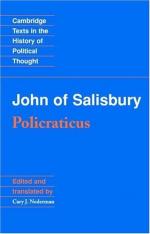|
This section contains 9,700 words (approx. 33 pages at 300 words per page) |

|
SOURCE: Nederman, Cary J., and Catherine Campbell. “Priests, Kings, and Tyrants: Spiritual and Temporal Power in John of Salisbury's Policraticus.” Speculum 66, no. 3 (July 1991): 572-90.
In the following essay, Nederman and Campbell examine John's views on the relationship between church and temporal government, focusing on why scholars have differed considerably in their readings of his position.
As one might expect of an author of the complexity of John of Salisbury, there is little scholarly agreement regarding the proper interpretation of the major features of his social and political thought. The twelfth-century churchman has always been a controversial figure. Since the late Middle Ages, the ideas contained in his main contribution to political theory, the Policraticus (completed in 1159), have been widely analyzed and interpreted.1 In more recent years, controversy has raged about the nature and significance of many of his main doctrines (such as tyrannicide and the organic analogy),2 his...
|
This section contains 9,700 words (approx. 33 pages at 300 words per page) |

|


